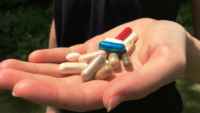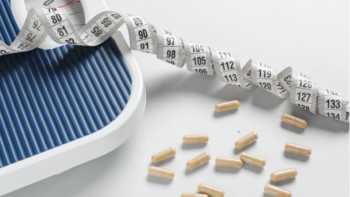
Answer:
Akkermansia muciniphila probiotics have been promoted for numerous health conditions, including insulin resistance, diabetes, weight loss, cancer, fatty liver disease, anti-aging, ALS (amyotrophic lateral sclerosis), Alzheimer's disease, osteoporosis, and chronic kidney disease.
However, as discussed below, there is little to no clinical research demonstrating a benefit with Akkermansia muciniphila for these conditions and results have generally been modest at best. There are also possible side effects and safety concerns associated with Akkermansia muciniphila.
Also see our Probiotics Review in which we tested supplements from Pendulum that include Akkermansia muciniphila.
What Is Akkermansia muciniphila
Akkermansia muciniphila, often referred to as a "next generation probiotic," is a species of bacteria that makes up about 3% to 5% of gut bacteria in healthy adults (Li, Front Microbiol 2024; Xu, Front Microbiol 2020). It is believed to colonize the human intestines during infancy and decline in abundance with age (Yang, Front Immunol 2025).
Laboratory and animal studies suggest that Akkermansia muciniphila helps maintain the protective mucus layer of the gut by breaking down the glycoproteins that form this mucus layer, which stimulates the production of new mucus. Like other probiotics, Akkermansia muciniphila also helps convert dietary fiber into butyrate and other short-chain fatty acids that may have beneficial effects on metabolism. In mice, a short-chain fatty acid and metabolite of Akkermansia muciniphila, known as propionate, has been shown to stimulate the secretion of GLP-1 (Li, Front Microbiol 2023).
Possible Health Benefits of Akkermansia muciniphila
Diabetes and blood sugar control
Akkermansia muciniphila is commonly promoted for blood sugar control, although the clinical evidence to support this is mixed and not very compelling.
A small study among adults with insulin resistance found that taking 10 billion cells of pasteurized (i.e., heat-killed) Akkermansia muciniphila (strain not specified) once daily for three months increased insulin sensitivity and reduced insulinemia compared to placebo. However, supplementation did not affect HbA1c (a measure of blood sugar levels over several months) or blood levels of GLP-1 and, interestingly, taking the same daily dose of live (not pasteurized) Akkermansia muciniphila did not significantly improve these outcomes compared to placebo. The authors of the study hold a patent for use of Akkermansia muciniphila for improving metabolic status (Depommier, Nat Med 2019).
A study among adults with type 2 diabetes being treated with metformin found that taking 1.2 billion cells of Akkermansia muciniphila WB-STR-0001 daily as part of a "proprietary blend" that included four other strains of probiotics and inulin for 12 weeks diminished the rise in total blood sugar levels following a meal and slightly decreased HbA1c compared to a placebo group, but supplementation did not improve insulin response after the meal or insulin resistance (as measured by HOMA-IR), nor did it improve fasting blood sugar levels (Perraudeau, BMJ Open Diabetes Res Care 2020). All study authors were employees of Pendulum Therapeutics, Inc., which sells what appears to be a similar formula (Pendulum Glucose Control) to what was used in the study, although the label for Pendulum Glucose Control does not provide the amounts of each probiotic strain or the amounts of chicory inulin and oligofructose.
Another study among adults with type 2 diabetes not treated with medication found that, overall, supplementation with 150 billion cells of live Akkermansia muciniphila WST01 (taken as a powder mixed with water 20 to 30 minutes after breakfast) once daily for 12 weeks did not decrease fasting blood sugar or the rise in blood sugar after eating, nor did it decrease HbA1c or improve insulin function compared to placebo. However, subgroup analysis suggested that Akkermansia muciniphila might improve HbA1c for those with low levels of this bacteria in the gut prior to treatment, but it may not be beneficial among those who already have high gut levels of Akkermansia muciniphila (Zhang, Cell Metab 2025).
For more details about these studies, see the Blood Sugar Control section of our Probiotic Supplements Review. Also see our article about supplements for controlling blood sugar.
Weight Loss & Appetite Control
Akkermansia muciniphila is believed to improve metabolism and stimulate the secretion of GLP-1, which may contribute to weight loss (Li, Front Microbiol 2023). However, most clinical research suggests no benefit of Akkermansia muciniphila for this use.
In the Depommier study discussed above, which included 32 overweight/obese adults with insulin resistance, taking 10 billion cells of pasteurized (i.e., heat-killed) or live Akkermansia muciniphila (strain not specified) once daily for three months without changing diet or activity levels did not significantly decrease bodyweight or fat mass compared to placebo, and supplementation did not affect blood levels of GLP-1 (Depommier, Nat Med 2019).
In the Perraudeau study, also discussed above and that included 58 adults with type 2 diabetes treated with metformin, taking 1.2 billion cells of Akkermansia muciniphila WB-STR-0001 daily as part of a "proprietary blend" that included four other strains of probiotics and inulin for 12 weeks did not decrease body weight compared to placebo. GLP-1 levels were not measured (Perraudeau, BMJ Open Diabetes Res Care 2020). All study researchers were employees of Pendulum Therapeutics, Inc., which sells Pendulum Glucose Control — a product that appears to be a similar formula, although the label for this product does not provide the amounts of each probiotic strain.
Finally, in the Zhang study (discussed above), which included overweight/obese adults with type 2 diabetes not being treated with medication for diabetes, taking 150 billion cells of live Akkermansia muciniphila WST01 once daily at breakfast time for 12 weeks did not decrease bodyweight or BMI compared to placebo. However, among those with relatively low levels of Akkermansia muciniphila in the gut at the start of the study, supplementation increased Akkermansia muciniphila colonization in the gut and slightly decreased bodyweight (-2.6 lbs) and BMI (-0.43 kg/m2) compared to baseline, while the group with high gut levels of Akkermansia muciniphila at baseline showed no significant improvements in these outcomes (Zhang, Cell Metab 2025).
For information about other supplements commonly used for weight loss, see our Weight Loss Supplements Review.
Fatty Liver Disease
Decreased abundance of Akkermansia muciniphila has been linked with metabolic dysfunction-associated steatotic liver disease (MASLD — previously called non-alcoholic fatty liver disease or NAFLD), liver cirrhosis, and liver cancer (Zhang, Future Microbiol 2024). However, there do not appear to be any published, placebo-controlled clinical studies evaluating Akkermansia muciniphila for these conditions, although a clinical trial is currently recruiting patients to determine if Akkermansia muciniphila NTUH_Amuc03 supplementation improves liver fibrosis among people with MASLD (ClinicalTrials.gov, NCT06873165).
For information about other supplements used for fatty liver disease, see our article about supplements and diets for fatty liver disease.
Cancer
Preliminary research found that cancer patients who respond to immunotherapy often have more Akkermansia muciniphila in their gut before treatment, but no published, placebo-controlled clinical studies have evaluated if Akkermansia muciniphila supplementation improves treatment outcomes in cancer patients.
An observational study among people with non-small cell lung cancer (NSCLC) or renal cell carcinoma (a common type of kidney cancer) who were being treated with immune checkpoint inhibitors (drugs that work by "releasing the brakes" on the immune system to help it recognize and destroy cancer cells) found that Akkermansia muciniphila could be detected in stool samples of 69% of people who demonstrated partial response, 58% of those who showed stable disease, and only 34% of those who experienced disease progression or death (Routy, Science 2018). A subsequent study among people with NSCLC treated with immune checkpoint inhibitors found that overall survival was about 3.4 months longer for those who were Akkermansia muciniphila positive compared to those who were negative (Derosa, Nat Med 2022). Based on these results, there is interest in Akkermansia muciniphila supplementation for improving cancer treatment response, but there are currently no published, placebo-controlled studies assessing this outcome. However, one preliminary study among patients with renal cell carcinoma who tested negative for stool Akkermansia muciniphila at baseline found that taking a specific strain of Akkermansia muciniphila P2261 (Oncobax®-AK, which is classified as a "live biotherapeutic product," not a supplement) along with immune checkpoint inhibitors was safe (Derosa, Cancer Res 2025), and another study that will assess the safety and effectiveness of Oncobax®-AK for patients with renal cell carcinoma or NSCLC is currently recruiting participants (ClinicalTrials.gov, NCT05865730).
A study among patients with B-cell lymphoma (a type of blood cancer) found that 100% of those who had Akkermansia muciniphila in their gut microbiota prior to receiving CAR T-cell therapy (a process that involves genetically engineering a patient's own immune T-cells to recognize and attack cancer cells) had progression-free survival after 6 months compared to only 42% of those who were Akkermansia muciniphila negative before treatment (Marcos-Kovandzic, Cancer Discov 2025). However, there do not appear to be any clinical studies assessing Akkermansia muciniphila along with CAR T-cell therapy for treating lymphoma.
Other Uses
Akkermansia muciniphila supplementation might have an anti-aging effect, as was suggested by animal studies in which aged mice given Akkermansia muciniphila showed extended healthy lifespans, reduced aged-related muscle atrophy, and reduced frailty (Shin, Microbiome 2021; Bárcena, Nat Med 2019). However, this has not been evaluated in humans.
Akkermansia muciniphila might also have neuroprotective effects, although this has not been confirmed in clinical research. One laboratory study showed that Akkermansia muciniphila supplementation increased neurons in the spinal cord and improved motor symptoms in a mouse model of ALS (amyotrophic lateral sclerosis, a.k.a., Lou Gehrig's disease) (Blacher, Nature 2019). Another laboratory study showed that Akkermansia muciniphila supplementation reduced brain levels of amyloid beta-protein (a biomarker of Alzheimer's disease) and improved memory and cognitive function in a mouse model of this condition (Ou, Nutr Diabetes 2020). Be aware, however, that Akkermansia muciniphila has been linked with Parkinson's disease (see below).
Some research suggests that Akkermansia muciniphila abundance is lower in stool samples of people with osteoporosis compared to those without this condition, and increased stool levels of Akkermansia muciniphila have been linked with increased bone formation markers and decreased bone resorption markers (Qin, Front Cell Dev Biol 2021; Raftar, J Diabetes Metab Disord 2021). However, there do not appear to be any studies proving that Akkermansia muciniphila supplementation prevents or treats osteoporosis.
Chronic kidney disease (CKD) has been linked with a lower abundance of Akkermansia muciniphila in the gut compared to healthy people (Li, Front Cell Infect Microbiol 2019), and supplementation with Akkermansia muciniphila improved kidney function and reduced damage to kidney tubules and capillaries in a rat model of CKD (Pei, Microb Pathog 2023), but there do not appear to be any studies assessing the effects of Akkermansia muciniphila on kidney function in people.
Safety
Although generally well-tolerated in clinical research (Zhang, Cell Metab 2025; Perraudeau, BMJ Open Diabetes Res Care 2020; Depommier, Nat Med 2019), be aware there is some concern that increasing Akkermansia muciniphila in the gut might worsen inflammation in the digestive tract in people with certain conditions, such as inflammatory bowel disease and inflammatory Salmonella typhimurium infection (Chiantera, Life (Basel) 2023).
Although some animal research suggests that Akkermansia muciniphila supplementation may decrease the size and number of tumors in a model of colorectal cancer, contradictory results exist (Gubernatorova, Front Immunol 2023). For example, a laboratory study using a mouse model of colitis-associated colorectal cancer found that mice given Akkermansia muciniphila were more susceptible to colitis-associated colorectal cancer than those not given Akkermansia muciniphila (Wang, J Cancer 2022). Also a comparison of stool microbiome samples from healthy adults and those with colorectal cancer found that those with colorectal cancer had about 4-fold higher abundance of Akkermansia muciniphila compared to healthy individuals (Weir, PLoS One 2013). People with or at risk for colorectal cancer should use caution when supplementing with Akkermansia muciniphila.
People with Parkinson's disease have been found to have increased stool levels of Akkermansia muciniphila compared to those without Parkinson's disease (Zapala, J Clin Med 2021; Bedarf, Genome Med 2017). Also, an animal study showed that Akkermansia muciniphila supplementation increased alpha-synuclein aggregation (a factor thought to contribute to Parkinson's disease) in gut cells connected to certain nerve cells in mice (Neto, iScience 2022). People with or at risk for Parkinson's disease should use caution when supplementing with Akkermansia muciniphila.
Join today to unlock all member benefits including full access to all CL Answers and over 1,400 reviews.
Join NowAlready a member? Sign In Here.
Join now at www.consumerlab.com/join/

















Submit your comment
This feature is restricted to active members.
Join now to add comments and get all member benefits, including over 1,400 reviews.
Join NowAlready a member? Sign in here.